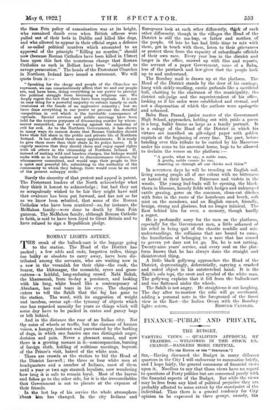BOMBAY LIGHTS ASTERN.
THE creak of the bullock-cart is the luggage going to the station. The Head of the District has packed ; a few odds and ends, forgotten trifles, things too bulky or obsolete to carry away, have been dis- tributed among the servants, who are waiting now in a row in the verandah for their chits—the cook, the bearer, the khitmagar, the messaichi, syces and grass- cutters—a faithful, long-enduring crowd. Nabi Baksh, the lc.hansamah, from to-day a pensioner, and looking with his long, white beard like a contemporary of Abraham, has real tears in his eyes. The chaprassi enters to tell the Sahib that the boj has gone to the station. The word, with its suggestion of weight and incubus, -seems apt—the tyranny of objects which one has regarded uneasily for years as things which will some day have to be packed in crates and gunny bags or left behind.
And in the distance the roar of an Indian city. Not the noise of wheels or traffic, but the clamour of human voices, a hungry, insistent wail punctuated by the barking of dogs, in which one fancies one can distinguish anger, derision and pain. Never a pleasant sound, and now there is a growing menace in it—noncooperation, burning of foreign cloth, holding of seditious meetings, boycott of the Prince's visit, hatred of the white man.
There are crowds at the station to bid the Head of the District farewell ; the three or four white men at headquarters and a number of Indians, most of them until a year or two ago staunch loyalists, now wondering -how long it is safe to remain loyal. Most of the loaves and fishes go to the other side, for it is the irreconcilables that Government is out to placate at' the expense of their friends.
• In the last lap of his service the whole atmosphere about hom has changed. In the city Indians and Europeans look at each other differently, tilbric of each other differently, though in the villages the Head of the District is still the ma-bap, or father and mother, of the people. Of late he has had_ little time to mix with them, get in touch with them, listen to their grievances or protect them from the rapacity of subordinde officials of their own race. Every year less in the district and longer in the office, snowed up with files and reports, the servant of a paper Government, more of a Babu, less of the patriarch and law-giver that the people look up to and understand.
The Bombay mail is drawn up at the platform. The Head of the District stands by the door of his carriage, hung with sickly-smelling, exotic garlands like a sacrificial bull, chatting to the chairman of the municipality, the district sub-judge and the superintendent of his office. looking as if his order were established and eternal, and not a dispensation of which the authors were apologetic and ashamed.
Babu Ram Prasad, junior master of the Government High School, approaches, holding out with pride a poem in a long, bulky frame as large as a family portrait. It is a eulogy of the Head of the District in which his virtues are inscribed on gilt-edged paper with golden capitals at the beginning of every lino. The poet, before handing over this tribute to be carried by his Maecenas under his arms-to his ancestral home, begs to be allowed to declaim the verses on the platform :- " A gentle, what to say, a noble man,
A gentle, noble course ho ran, Assisting us through all our thicks and thins."
In seventeen days he will be treading on English soil, living among people all of one colour with no bitterness or hatred in their hearts. Primroses and violets in the woods. The young leaf-buds will be opening, the black- thorn in blossom, homely fields with hedges and unhumped cattle grazing, gorse on the common, clean-cut ditches with ferns in the roots of the hornbeam and beech, soft mist on the meadows, and an English sunset, friendly, benign, strong and glorious, but no longer inimical. The East behind him for ever, a memory, though hardly a regret.
Ho is profoundly sorry for the mon on the platform, especially for the Government men, a little ashamed of his relief in being quit of the chaotic muddle and mis- understandings, the collisions that are bound to come, the humiliation of belonging to a race that has ceased to govern yet dare not let go. No, ho is not ratting. Twenty-nine years' service, and every soul on the plat- form knows that he has always done the straight and disinterested thing.
A little black gollywog approaches the Head of the District, deprecatingly, deferentially, carrying a crushed and soiled object in his outstretched hand. It is the Sahib's soda topi, the crest and symbol of the white man. The golly-wog explains that it fell from the bullock-cart and was flattened under the wheels.
The Sahib is not angry. He straightens it out laughing. The day after to-morrow the relic will go overboard, adding a personal note in the foreground- of the finest view in the East—the Indian Ocean with the Bombay


































 Previous page
Previous page